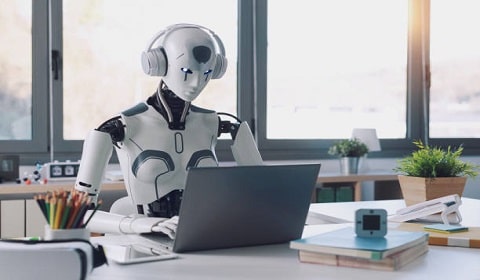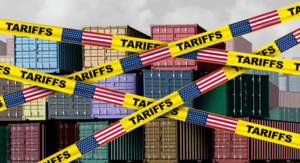
Impact of Artificial Intelligence on Employment
The impact of artificial intelligence on employment is significant, reshaping traditional employment paradigms. As AI technologies advance, routine tasks are increasingly automated, altering job requirements and skill sets.
While this fosters efficiency and innovation, it also raises concerns about job displacement and the need for upskilling. The demand for tech-savvy professionals rises, creating a dichotomy in the labor market. Policymakers grapple with the challenge of ensuring equitable access to opportunities amidst this transformative shift.
As AI continues to evolve, understanding its multifaceted impact on labor economics becomes essential for navigating a future where the nature of work undergoes continuous metamorphosis.
Table of Contents
Impact of Artificial Intelligence on Employment
The impact of artificial intelligence on employment has become increasingly evident as AI emerges as a transformative force in various industries, reshaping the landscape of work. As technology advances, the integration of AI into workplaces brings about significant changes in job markets, skill requirements, and overall economic dynamics.
This article explores the multifaceted impact of AI on labor economics, examining key trends, challenges, and opportunities. The transformative influence of AI is unmistakable, fostering both efficiency and innovation.
However, it also raises concerns about job displacement and the imperative for upskilling to meet the evolving demands of the tech-centric labor market.
1. Automation and Job Displacement
The impact of artificial intelligence on employment is profound, primarily evident in the automation of routine tasks, enhancing efficiency and productivity across various sectors.
While this shift raises concerns about job displacement, the World Economic Forum anticipates that by 2025, automation could lead to the displacement of around 85 million jobs, but simultaneously create approximately 97 million new jobs, resulting in a net positive impact on employment.
Navigating this transition successfully requires robust reskilling and upskilling initiatives to align the workforce with the evolving demands of the job market.
dynamic relationship between AI and employment underscores the need for proactive measures to ensure a balanced and inclusive future for the global workforce.
Read More: 15 Econometric Software Packages
2. Changing Skill Requirements
As AI proliferates, the employment landscape is evolving, placing greater emphasis on skills such as creativity, critical thinking, emotional intelligence, and complex problem-solving. McKinsey’s study predicts a 24% increase in demand for cognitive skills and a 22% rise in social skills by 2030.
This underscores the pressing need to reshape education and training initiatives to equip the workforce with these crucial abilities.
The impact of artificial intelligence on employment is a central concern, as automation and technological advancements reshape job requirements, emphasizing the urgency of fostering a skill set that complements and harnesses the potential of AI in the workforce.
3. The Rise of Gig Economy and Flexible Work
The Impact of Artificial Intelligence on employment is evident in the transformative rise of the gig economy. AI-driven platforms are reshaping work dynamics by efficiently connecting freelancers and part-time workers with short-term projects, fostering flexibility in employment.
This shift challenges conventional labor market norms and structures, with a projected 40% of the U.S. workforce engaging in gig work by 2023, as per a study by Intuit.
AI not only streamlines job matching processes but also accelerates the pace of change in traditional employment relationships, emphasizing the dynamic influence of technology on the evolving nature of work.
4. Enhanced Productivity and Economic Growth
AI’s transformative potential lies in its ability to enhance productivity, fostering economic expansion. By automating mundane tasks, human professionals can redirect their efforts toward more intricate and imaginative aspects of their roles, elevating overall efficiency.
PwC’s forecast suggests AI could contribute $15.7 trillion to the global economy by 2030, underscoring its pivotal role in shaping future prosperity. Nevertheless, realizing these advantages demands strategic roadmap and investments, robust regulatory structures, and a workforce equipped with the necessary skills.
The economic impact of artificial intelligence on employment further underscores the imperative for proactive measures in navigating the evolving landscape of work. Balancing innovation with responsible policies becomes paramount in securing a harmonious coexistence between AI advancement and workforce sustainability.
5. Ethical Considerations and Bias in AI
The integration of AI in the labor market sparks ethical concerns, notably regarding algorithmic bias. Poorly designed AI systems can perpetuate existing biases, fostering discriminatory outcomes, especially in hiring processes, where algorithms may unintentionally favor specific demographics.
Addressing these concerns necessitates collaboration among policymakers, industry stakeholders, and technologists to ensure the responsible development and deployment of AI technologies. The impact of artificial intelligence on employment underscores the urgency of navigating these ethical challenges to safeguard fair and unbiased practices in the evolving landscape of work and technology.
6. Job Creation in AI-Related Industries
While some jobs may be displaced due to automation, the growth of AI-related industries is creating new employment opportunities. Roles such as data scientists, AI engineers, and machine learning specialists are in high demand. According to the World Economic Forum, the number of job postings for AI specialists on LinkedIn more than doubled from 2015 to 2019.
Governments and educational institutions need to foster a skilled workforce to meet the demand in these emerging fields. The impact of artificial intelligence on employment underscores the importance of adapting education and training programs to equip individuals with the skills necessary for the evolving job market, ensuring a balanced and resilient workforce amidst technological advancements.
7. Policy Implications and the Future of Work
The transformative impact of AI on labor economics necessitates proactive policy measures. Governments and institutions must invest in education and training programs that equip workers with the skills required in the AI-driven economy. Additionally, regulatory frameworks should be established to address ethical concerns, ensuring fair and unbiased AI applications.
Collaboration between public and private sectors is crucial to navigating the evolving landscape of work and ensuring that the benefits of AI are equitably distributed across society. The impact of artificial intelligence on employment underscores the urgency for comprehensive strategies that foster adaptability and inclusivity in the workforce, emphasizing the need for continuous dialogue and adaptation to the changing employment dynamics.
Bottom Line
Artificial intelligence is reshaping the world of work, presenting both economic challenges and opportunities. While concerns about job displacement and bias in AI algorithms persist, the potential for enhanced productivity, economic growth, and the creation of new job opportunities cannot be overlooked.
Navigating the impact of AI on labor economics requires a holistic approach, combining technological innovation with strategic policy measures to create a future workforce that is adaptable, skilled, and equipped to thrive in the AI-driven era. The impact of artificial intelligence on employment is a crucial aspect that demands careful consideration, necessitating proactive measures to harness its benefits while addressing potential disruptions in the job market.





